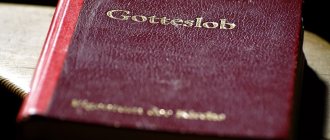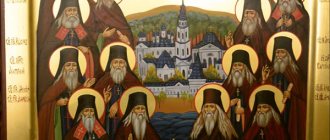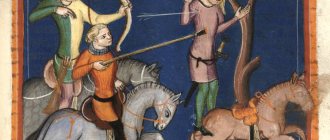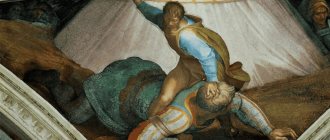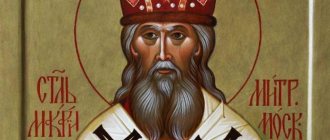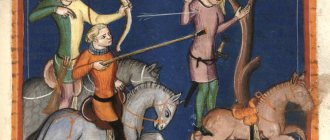For a Christian, the Psalter, like the Bible, is important spiritual reading. This is a believer’s handbook; reading it allows you to become closer to the Lord, find comfort and support from him in difficult times of life.
This storehouse of wisdom consists of many psalms, including Psalm 6. It will become indispensable when a person feels the need to turn to God, but does not find the right words to talk to him.
This is an ideal text for those who are in despair, because its author himself was in such a situation, relying at that moment only on the mercy of the Almighty. People's lives are full of failures and mistakes. On their way they encounter various problems and enemies, but everything can be overcome if you hold on to faith, cherish hope in your heart, follow the right path, remaining honest with yourself and the One Creator. Psalm 6 is a prayer for the protection and forgiveness that can be granted by God to those whose faith in him is truly strong.
The History of Psalm 6
The words at the beginning of the psalm indicate that it was created for musical performance, accompanied by eight-stringed instruments. This indicates his regular singing in the Jerusalem Temple. The inscription also confirms the authorship of King David, who at that time was undergoing life difficulties.
The anointed one suffered persecution from his own son, who persuaded high-ranking officials to betray the legitimate ruler. David was in poor health and was also experiencing family problems, which became retribution for his sin with Bathsheba.
The first kathisma of the psalter contains Psalm 6
Psalm 10
Psalm 10 interpretation
- “I trust in the Lord” - David always sought the Savior’s support in everything.
- “Fly to the mountain” - this refers to the Judean mountains, where one could hide from enemy attacks in caves. That is, David was considered weak and defenseless.
- “Speak to my soul” means “speak to me.”
- “When the foundations are destroyed” - in times of revolution in the foundations of political and social life. The conspirators did not recognize David as king; they wanted him to lose power.
- A “righteous person” is a believer who lives a righteous, pious life that glorifies the Lord.
- “The Lord tests the righteous” - The Lord sends trials and difficulties to righteous people to strengthen their spirit and their faith.
- “His soul hates” - the essence of God is alien to everything bad that causes pain and suffering.
God knows everything. He protects righteous people with his cover.
Brief interpretation and main idea
The text conveys the deep experiences and suffering of the psalmist, who, in despair, asks for forgiveness and help. The interpretation of the prayer addressed to the Almighty is best considered in parts:
- Verse 1 – 3. David realizes the guilt of committing a sin with Bathsheba and asks not to punish him in his hour of despair. In his prayers, he cries for mercy by God's mercy, without remembering his achievements. Showing that this is nothing before the face of the almighty Creator.
- Verse 4 – 5. The lines fully show the king’s suffering not only from physical illness, but also from spiritual one. This is the result of failure to keep God's commandments.
- Verse 6. David asks for mercy so that he can glorify the Most High and fulfill his earthly destiny.
- Verse 7 – 8. The suffering of the author is shown, whose eyes are swollen and completely dry from shed tears.
- Verse 9 – 11. Through the lines one can trace the hope for forgiveness received from the Almighty. Because the nature of the presentation changes dramatically, which indicates a revelation descending from heaven on the psalmist.
Sinful affair with Bathsheba
The Tsar's Sufferings
Repentance for sin
Psalm of David 25
In the life of Christians, situations often arise when those closest to us betray us, lay claim to our goods or achievements, making false accusations and vainly accusing us.
Psalm 25 is a repentant psalm, an appeal to the Creator with a request to put the Lord’s protection against slander and deceit.
History of writing and meaning of the psalm
Great despair and sadness covered King David at the moment when he learned of the betrayal of his son Absalom. There are no open attacks yet, but the Jewish land is already filled with false rumors about the reign of God’s anointed. The righteous does not run to prove anything. He kneels before the throne of God in prayer.
At the time of writing Psalm 25, King David could freely visit the tabernacle and bring gifts.
This fact once again emphasizes that the time of writing is not associated with persecution from Saul, when the psalmist was forced to constantly hide.
2 Tempt me, O Lord, test me, set my womb and my heart on fire!
3 Your mercy is before my eyes, and I have pleased You by keeping Your truth.
4 I have not sat in the council of vain men, neither will I go in with the wicked.
5 I have hated the congregation of the wicked, and will not sit with the wicked.
6 I will wash my hands with the innocent, and will walk around your altar, O Lord;
7 Let me hear the song of Your glory and tell Your wonders.
8 Lord, I have loved the beauty of Your house and the holy place where Your glory dwells.
9 May you not destroy my soul with the wicked, or my life with men who shed blood!
10 Iniquity is in their hands, they are full of covetousness.
11 But I live in kindness; deliver me
12 Lord, have mercy on me! My feet are on the right path; I will bless You in the churches, Lord!
Interpretation of Psalm 25
In the first verses of his prayer, the psalmist emphasizes his integrity. This does not mean that David is unaware of sinfulness or considers himself holy.
With these verses, the king wants to convey to the Lord that he is not involved in the slanderous rumors that Absalom’s people are spreading.
The psalmist appeals to the Almighty, asking him to judge and justify him before the people, because he was exposed as an unjust judge, a bloodthirsty and stupid ruler.
The anointed one of God does not ask for undeserved protection, but only for an investigation of the present state of affairs, of which he does not recognize himself as a participant.
Quite boldly, the king claims that he is ready for any test to prove his innocence. The same request for testing is heard in the psalm, when David begs the Lord to show him the moment of transition to a dangerous path and direct him to the path of truth.
The anointed one of God understands the full responsibility of what is said, because the Creator does not look at deeds, but at thoughts and plans in the heart. How often do Christians in confession talk about their deeds, while forgetting that the Lord sees all the secret corners of the soul.
Truthfulness and sincerity of repentance always find answers to prayers at the feet of the Almighty. In verses 3-5 there is hope for just mercy. There are no words of repentance here, but only complete trust and expectation of a fair trial. Insidious, malicious people tried to destroy the king, he fenced himself off from any dealings with enemies.
We advise you to study the Prayer of the Kazan Mother of God
David further vows with full responsibility to continually offer sacrifices of praise and offerings on the altar while living a holy life.
By talking about washing his hands, he asserts his innocence in this situation.
Important! The righteous man loved the Creator with all his heart, coming to the temple at the behest of his heart, and not just to fulfill his religious duty, he drew strength and hope from his prayers for a righteous life. At the same time, David remembered and thanked the Creator for all the miracles created by God in his life
At the same time, David remembered and thanked the Creator for all the miracles created by God in his life.
By asserting his innocence, at the end of Psalm 25, David once again emphasizes the fact that he has nothing to do with the accusations of bloodthirstiness and bribery that Absalom speaks of. His enemies took and gave bribes to denigrate the righteous man; they were driven not by the desire for justice, but by a sense of self-interest and ambition.
The once close comrade Ahithophel also committed betrayal for the sake of profit, however, the feet of the righteous stand on the righteous road.
When and how to read Psalm 25
Sometimes Christians ask the Lord for things that could harm them in the future.
In order not to harm yourself and to accept the will of the Creator in humility and patience, it is recommended by the holy fathers of the church to read Psalm 25 in Russian in order to better understand each word.
The holy message of David will fill you with peace and hope at the moment:
- unjust persecution;
- slander;
- family misunderstandings;
- unfounded false accusations;
- searching for the true path.
Text of Psalm 6 in Russian
1 To the director of the choir. On eight string. Psalm of David.
2 Lord! Do not rebuke me in Your wrath, and do not punish me in Your anger.
3 Have mercy on me, O Lord, for I am weak; Heal me, O Lord, for my bones are shaken;
4 And my soul is greatly troubled; How long are you, Lord?
5 Turn, O Lord, deliver my soul, save me for the sake of Thy mercy,
6 For in death there is no remembrance of You: in the grave who will praise You?
7 I am weary with my groanings: I wash my bed every night, I wet my bed with my tears.
8 My eye is withered through sorrow, it is worn out because of all my enemies.
9 Depart from me, all you workers of iniquity, for the Lord has heard the voice of my crying,
10 The Lord has heard my prayer; The Lord will accept my prayer.
11 Let all my enemies be put to shame and sorely defeated; may they return and be ashamed instantly.
King David was an outstanding historical figure and psalmist. Using his life example, he showed that in any difficulties you can turn to the Almighty for help. The main thing is to sincerely repent of your sins and hope for forgiveness.
If you find an error, please select a piece of text and press Ctrl+Enter.
Psalm 1
The first psalm is read to strengthen faith, about the prosperous life of church-going believers and the salvation of their souls.
Psalm 1 interpretation
- “Blessed” means happy, has earthly and spiritual well-being.
- “Husband” means not only a man, but a person in general.
- “Wicked” - one who does not accept God, or who follows his own feelings.
- “Sinner” - commits bad deeds contrary to God's laws.
- “The Corrupter” is the one who incites and tempts to commit sins.
- “The law of the Lord is his will” - it says about the righteousness and goodness of man.
- “Will” - in this context, desires and choices.
- “And he will be like a tree planted by streams of water” - he will be full of grace and strength given from above.
- “Which bears its fruit in its season, and whose leaf does not wither” - everything will work out, spiritually and physically unharmed, since God will become its patron.
- “Not so” - those who rebel against God and sow evil.
- “They are right, blown by the wind” - i.e. wicked people will not obtain soul salvation.
- “The Lord “knows” - loves, protects, knows everything about us.
- “Path” - idea, intentions, actions, direction.
Psalm 2
The second psalm is read about the salvation of the people and the admonition of the sinful government, which oppresses people and goes against God, violating all his laws.
Psalm 2 interpretation
- “Restless” - worried, betraying their hearts and minds to vanity.
- “They are plotting in vain” - meaning the impracticable.
- “Tsars” are a higher authority, in the modern world politicians and presidents.
- “Princes” are military leaders, high-class managers.
- “They rebel” - they oppose God and Christian teaching.
- “They take counsel together against the Lord” - they openly speak out and take any measures.
- “To break the bonds” - to separate, to win.
- “Overthrow the shackles” - free yourself from their pressure and influence.
- “He who lives in heaven will laugh” - i.e. God will rejoice.
- “The Lord will reproach them” means he will also stand up against the wicked rulers.
We advise you to study the Prayers before reading the Gospel and after
This means that if David is submissive to the Savior, He will give him the power to glorify faith.
That is, David will receive enormous power over his enemies and will win victory over them.
A call to the commanders-in-chief to settle down and accept God into their hearts, to stop doing evil.
Psalm 8
The eighth psalm expresses gratitude to the Creator for creating man, giving him land, water and the opportunity to dominate nature and animals.
Psalm 8 interpretation
- “Finger” - from Straslavic “finger”. This word is used to show the power and greatness of the Creator.
- “On the moon and stars that You have placed... that is
, that You remember him (Ps. 8.5) - this means that everything in nature was created by God, including man himself.
- “He put everything under his feet” - God gave man a whole planet, water and land, birds, fish and animals.
- “He made him ruler” - and gave him the right to rule over this planet.
- “Lord, our God” - despite the beautiful nature of man, he is still lower than the Almighty.
- “How majestic is Your name” - David shows respect for God.
